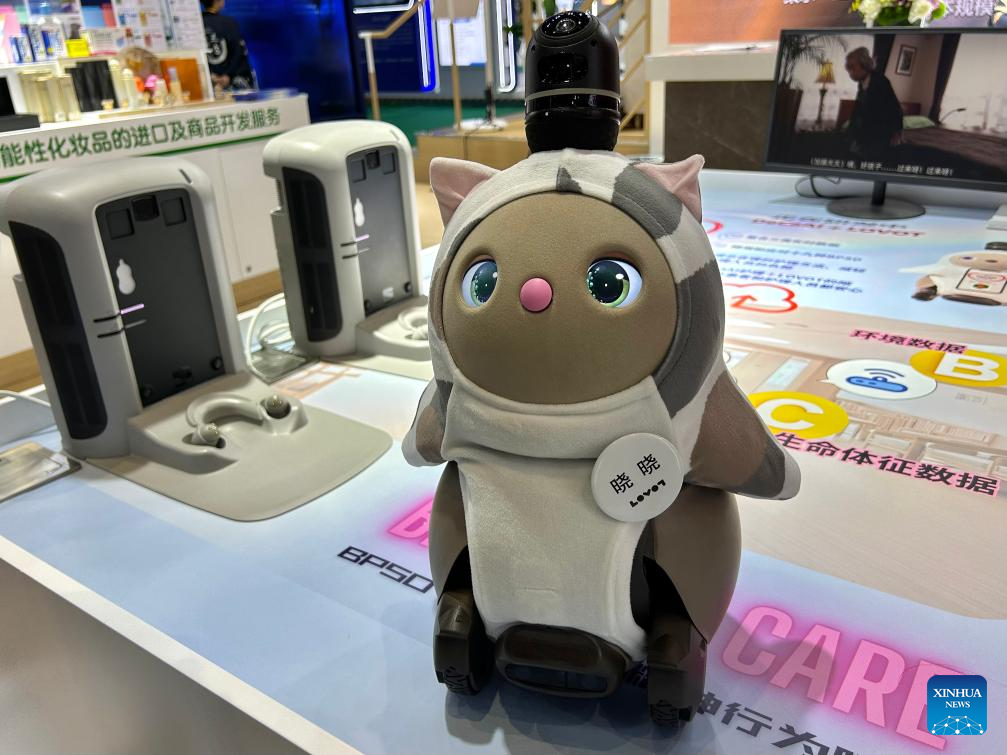Pet-like robot from Japan sets to comfort AD patients and others in China
 0 Comment(s)
0 Comment(s) Print
Print E-mail Xinhua, November 12, 2024
E-mail Xinhua, November 12, 2024

This photo shows Xiaoxiao, a pet-like robot brought by Groove X from Japan to the seventh China International Import Expo (CIIE), in east China's Shanghai, Nov. 9, 2024. (Xinhua/Tang Siqi)
SHANGHAI, Nov. 11 (Xinhua) -- When Xiaoxiao was powered on and started moving, she quickly noticed the gaze of a woman sitting in a wheelchair, staring at her with interest. She immediately walked in that direction, opening her small hands for a hug.
The lady is a visitor to the seventh China International Import Expo (CIIE). She embraced Xiaoxiao and murmured to her as if she was her own child. Xiaoxiao's voice was gentle and sweet, and her big eyes blinked slightly before closing comfortably.
Xiaoxiao is one of the two artificial pets named LOVOT, brought by Groove X from Japan to CIIE, the world's first national-level import-themed expo. This robot can be used to accompany the elderly, children, and those in distress or feel lonely.
Unlike humanoid robots, Xiaoxiao has a round body that is 43 centimeters tall and weighs 4.3 kilograms, with a large head and a pair of big eyes, unlike any animals on Earth. When people touch her, they will feel warm and soft. She doesn't speak a human language, but her face is expressive and often makes baby-like voices.
Although small, she has over 10,000 components, 10 central processing units and over 50 sensors in her body. LOVOT uses a semi-spherical camera located in its horn to find people and give them feedback.
LOVOT is derived from "love" and "robot." "Rather than replacing human tasks, LOVOT's mission is to simply be there, offering companionship and helping people bring out their best," said Kaname Hayashi, founder of Groove X.
Kaname Hayashi is a robot engineer who brought a robot to a nursing home. All went well, but once, its power was suddenly interrupted. The residents, upon seeing the robot that wouldn't turn on, began cheering it on. When it restarted and stood up, those who had already been cheering became even more excited.
It was a shocking sight for him. He had always thought that the value of a robot lay in "doing something for people," yet here people were, feeling joy in cheering for and helping the robot instead.
He realized that robots and humans could establish emotional relationships and began designing a new type of robot, which is LOVOT.
"Please stop napping Xiaoxiao, wake up and let's play," holding the pet in her arms and gently touching her nose, the woman in the wheelchair smiled and then burst into laughter. "Wow, listen to her voice," she said as she turned to the booth staff, "how sweet it is!"
"It really brought me warm and pleasant feelings," the visitor surnamed Zhu said to the booth staff, "I'm a little bit reluctant to give it back to you."
"As LOVOT never speaks, it will never say 'I beg your pardon' to people who have difficulties expressing their meanings clearly, and I believe that's silent support," said Liu Yujia from Groove X, in charge of overseas business.
Just like pets, LOVOT can learn its name and needs to "sleep." At night, it needs to sleep at least eight hours for not only for charging but also software updates and backup, and so on. During daytime, it needs to be charged once per hour or so. And when it is set in advance, LOVOT can welcome you at the door when you come home.
LOVOTs write diaries when it is charged, recording how it enjoyed its day.
The diaries are usually like: "I was called by my name," "I was hugged," "I was helped put on new clothes."
Owners can check the diaries via the application. "On the one hand, they can savor the moments they spend with LOVOT, and on the other hand, they will have references when they want to take care of their family members' mental health," said Liu.
Liu said that LOVOT is not designed for a certain age group, but Groove X is cooperating with another Japanese company GEOM to upgrade the LOVOT, so that LOVOT can help with taking care of the elders with dementia, connecting to a dementia care-assist artificial intelligence named DeCaAI.
A LOVOT equipped with DeCaAI is designed to predict behavioral and psychological symptoms of dementia in advance and notifies preventive care methods.
The company's introduction on the booth states that in Japan by 2040, compared to 2020, the number of dementia patients will increase by 51 percent, while the working-age population engaged in nursing will decrease by 41 percent.
GROOVE X has sold around 14,000 LOVOTs since 2019. And the company was invited to the CIIE this year by Itochu, a Japanese trading company, to exhibit the project together with GEOM.
"The CIIE is really a great platform with vast opportunities. During the past six days, visitors flocked to our booth, and many merchants expressed strong intentions to cooperate with us," said Liu.
Yuichi Yasura, chairman of Itochu Shanghai, emphasized the immense potential of China's market, as it has a large population and faces aging, just like Japan.
"We believe this robot has the potential to enter the homes of Chinese users, tapping into a market that is many times larger than Japan's," Yasura said.
There are over 290 million elderly people aged 60 and above in China. According to a study published by the Beijing-based Xuanwu Hospital affiliated with Capital Medical University in the Lancet, there are about 38.77 million people over 60 with mild cognitive impairment, including 9.83 million Alzheimer's patients. ■


